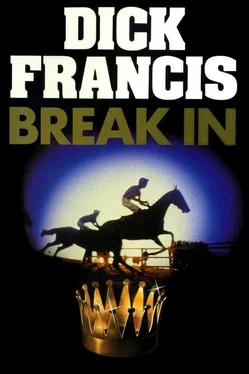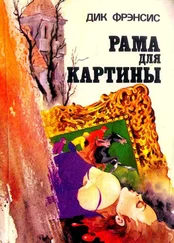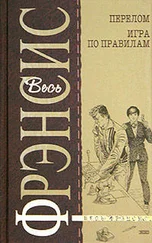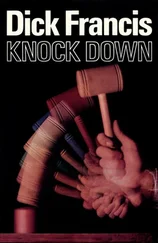‘You could say,’ I suggested, ‘that you were your editor’s secretary, and it was urgent.’
She looked at me in disbelief. ‘And why the hell should I?’
‘Because you trade in favours.’
‘Jee — sus.’ She blinked the pale blue eyes.
‘Any time,’ I said. ‘I’ll pay. I took it for granted that this...’ I held up the tape, ‘was on account.’
‘The telephone,’ she said, ‘makes it two favours.’
‘All right.’
She said with amusement, ‘Is this how you win your races?’ She turned without waiting for an answer and led the way back roughly to where we had started from but ending in a small, bare little room furnished only with three or four chairs, a table and a telephone.
‘Interview room,’ Rose said. ‘General purposes. Not used much. I’m not having anyone hear me make this call.’
She sat on one of the chairs looking exotically sensuous and behaving with middle-class propriety, the baroque façade for frighteners, the sensible woman beneath.
‘You’ll have about ten seconds, if that,’ she said, stretching out the bracelets for the telephone. ‘Leggatt will know straight away you’re not our editor. Our editor comes from Yorkshire and still sounds like it.’
I nodded.
She got an outside line and with long red nails tapped in the Flag’s number, which she knew by heart; and within a minute, after out-blarneying the Irish, she handed me the receiver silently.
‘Hello, Martin, what goes?’ an unenthusiastic voice said.
I said slowly and clearly, ‘Owen Watts left his credit cards in Bobby Allardeck’s garden.’
‘What? I don’t see...’ There was a sudden silence. ‘Who is this?’
‘Jay Erskine,’ I said, ‘left his Press Club card in the same place. To whom should I report these losses? To the Press Council, the police or my member of parliament?’
‘Who is that?’ he asked flatly.
‘I’m speaking from a telephone in the Towncrier. Will you talk to me in your office, or shall I give the Towncrier a scoop?’
There was a long pause. I waited. His voice then said, ‘I’ll ring you back. Give me your extension.’
‘No,’ I said. ‘Now or never.’
A much shorter pause. ‘Very well. Come to the front desk. Say you’re from the Towncrier.’
‘I’ll be there.’
He crashed the telephone down as soon as I’d finished speaking, and Rose was staring at me as if alarmed for my wholeness of mind.
‘No one speaks to editors like that,’ she said.
‘Yeah... well, I don’t work for him. And somewhere along the way I’ve learned not to be afraid of people. I was never afraid of horses. People were more difficult.’
She said with a touch of seriousness, ‘People can harm you.’
‘They sure can. But I’d get nowhere with Leggatt by being soft.’
‘Where do you want to be?’ she asked. ‘What’s this scoop you’re not giving the Towncrier ?’
‘Nothing much. Just some dirty tricks the Flag indulged in to get their Allardeck story for Intimate Details.’
She shrugged. ‘I doubt if we’d print that.’
‘Maybe not. What’s the limit journalists will go to to get a story?’
‘No limit. Up Everest, into battlefields, along the gutters, anywhere a scandal leads. I’ve done my crusading time in rotten health farms, corrupt local governments, nutty religions. I’ve seen more dirt, more famine, more poverty, more tragedy than I need. I’ve sat through nights with parents of murdered children and I’ve been in a village of lifeboatmen’s widows weeping for their dead. And then some damn fool man expects me to go sit on a prissy gilt chair and swoon over skirt lengths in some goddam Paris salon. I’ve never been a women’s writer and I’m bloody well not starting now.’
She stopped, smiled twistedly, ‘My feminism’s showing.’
‘Say you won’t go,’ I said. ‘If it’s a demotion, refuse it. You’ve got the clout. No one expects you to write about fashion, and I agree with you, you shouldn’t.’
She gave me a long look. ‘I wouldn’t be fired, but he’s new, he’s a chauvinist, he could certainly make life difficult.’
‘You,’ I said, ‘are one very marketable lady. Get out the famous poison fangs. A little venom might work wonders.’
She stood up, stretching tall, putting her hands on her heavily belted hips. She looked like an Amazon equipped for battle but I could still sense the indecision inside. I stood also, to the same height, and kissed her cheek.
‘Very brotherly,’ she said dryly. ‘Is that all?’
‘That’s all you want, isn’t it?’
‘Yes,’ she said, mildly surprised. ‘You’re goddam right.’
The Daily Flag , along Fleet Street from the Towncrier , had either been built much later or had been done over in Modern Flashy.
There was a fountain throwing out negative ions in the foyer and ceiling-wide chandeliers of thin vertical shimmering glass rods, each emitting light at its downward tip. Also a marble floor, futuristic seating and a security desk populated by four large men in intimidating uniforms.
I told one of them I’d come from the Towncrier to see Mr Leggatt and half expected to be thrown out bodily into the street. All that happened, however, was that after a check against a list on the desk I was directed upwards with the same lack of interest as I’d met with on friendlier territory.
Upstairs the decorative contrast continued. Walls in the Flag were pale orange with red flecks, the desks shining green plastic, the floor carpeted with busy orange and red zigzags, the whole a study in unrestfulness. Anger on every page, I thought, and no wonder.
Sam Leggatt’s office had an opaque glass door marked ‘editor’ in large lower-case white letters, followed some way below by smaller but similar letters telling callers to ring bell and wait.
I rang the bell and waited, and presently with a buzz the door swung inwards a few inches. Sam Leggatt might not actually wear a bullet-proof vest but his defences against people with grievances were impressive.
I pushed the door open further and went in to another brash display of rotten taste: black plastic desk, red wallpaper flecked in a geometric pattern, and a mottled green carpet, which as a working environment would have sent me screaming to the bottle.
There were two shirt-sleeved men in there, both standing, both apparently impervious to their surroundings. One was short, stubby and sandy-haired, the other taller, stooped, bespectacled and going bald. Both about fifty, I thought. A third man, younger, sat in a corner, in a suit, watchful and quiet.
‘Mr Leggatt?’ I said.
The short sandy-haired one said, ‘I’m Leggatt. I’ll give you five minutes.’ He inclined his head towards the taller man beside him. ‘This is Tug Tunny, who edits Intimate Details. That is Mr Evans from our legal department. So who are you, and what do you want?’
Tug Tunny snapped his fingers. ‘I know who he is,’ he said. ‘Jockey. That jockey.’ He searched for the name in his memory and found it. ‘Fielding. Champion jockey.’
I nodded, and it seemed to me that they all relaxed. There was a trace of arrogance all the same in the way Leggatt stood, and a suggestion of pugnaciousness, but not more, I supposed, than his eminence and the circumstances warranted, and he spoke and behaved without bluster throughout.
‘What do you want?’ Leggatt repeated, but lacking quite the same tension as when I’d entered; and it crossed my mind as he spoke that with his passion for security they would be recording the conversation, and that I was speaking into an open microphone somewhere out of sight.
Читать дальше




